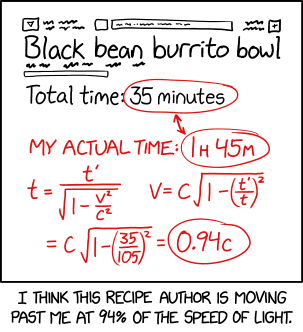time
frames of reference#
coordinate time#
The time as observed by the coordinate frame itself. This is a "god's-eye view" of the time in the system we are analyzing. Basically, it represents a perfect clock held by the world/universe/simulation coordinate frame's observer. Usually Earth-centric systems use UTC or TAI as the Coordinate Time.
Formally, the coordinate time is the time that would be read on a hypothetical "coordinate clock" situated infinitely far from all gravitational masses, and stationary in the system of coordinates.
proper time#
The time as observed by a perfect clock attached to an object's local body frame. The body frame is a coordinate frame rigidly attached to the object. Whenever the object observes the time, it observes the local Proper Time.
In most situations, Proper Time and Coordinate Time are the same. The distinction between Proper Time and Coordinate Time is only relevant when objects are subjected to large accelerations or move across lumpy spacetime (like going from sea-level on Earth to standing on the Moon), and the effects of General Relativity become significant.
system time#
So far we've only talked about the hypothetical, perfect clocks that describe the physics. But we actually want to observe these times ourselves with real clocks. Unfortunately, no clock is perfect or ideal. The System Time is the real clock's observation of the local Proper Time. We'll explore System Time later when we learn more about Allan Variance.
relativity & time dilation#
Let's apply our knowledge of Special Relativity (SR) and General Relativity (GR) to understand the phenomenon of time dilation.
Special Relativity describes spacetime far from a significant gravity field, and explains how a stationary observer perceives time passing slower for a moving observer when the relative velocity between them is very large. Relative velocity is the distance traveled over time taken. Since the speed of light is constant, kinetic energy is working to "slow down" the proper time with respect to coordinate time to keep the equation valid. This is special relativity at work.
General Relativity deals with gravity, and explains how time slows down in the presence of a large gravitational potential. Scientists have sent ultra-precise clocks into the void beyond Earth and proved that proper time is slower for observers closer to the center of the gravity well. This is general relativity at work.
It's whack, but the math checks out and matches real observations. If you're still not convinced, look to time_dilation.ipynb for a worked out example.
precision#
(wip)

